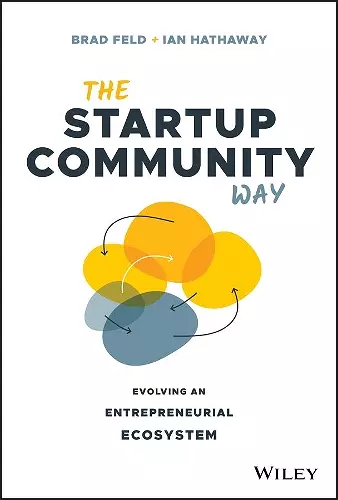The Startup Community Way
Evolving an Entrepreneurial Ecosystem
Brad Feld author Ian Hathaway author
Format:Hardback
Publisher:John Wiley & Sons Inc
Published:7th Sep '20
Should be back in stock very soon

The Way Forward for Entrepreneurship Around the World
We are in the midst of a startup revolution. The growth and proliferation of innovation-driven startup activity is profound, unprecedented, and global in scope. Today, it is understood that communities of support and knowledge-sharing go along with other resources. The importance of collaboration and a long-term commitment has gained wider acceptance. These principles are adopted in many startup communities throughout the world.
And yet, much more work is needed. Startup activity is highly concentrated in large cities. Governments and other actors such as large corporations and universities are not collaborating with each other nor with entrepreneurs as well as they could. Too often, these actors try to control activity or impose their view from the top-down, rather than supporting an environment that is led from the bottom-up. We continue to see a disconnect between an entrepreneurial mindset and that of many actors who wish to engage with and support entrepreneurship. There are structural reasons for this, but we can overcome many of these obstacles with appropriate focus and sustained practice.
No one tells this story better than Brad Feld and Ian Hathaway. The Startup Community Way: Evolving an Entrepreneurial Ecosystem explores what makes startup communities thrive and how to improve collaboration in these rapidly evolving, complex environments.
The Startup Community Way is an explanatory guide for startup communities. Rooted in the theory of complex systems, this book establishes the systemic properties of entrepreneurial ecosystems and explains why their complex nature leads people to make predictable mistakes. As complex systems, value creation occurs in startup communities primarily through the interaction of the "parts" - the people, organizations, resources, and conditions involved - not the parts themselves. This continual process of bottom-up interactions unfolds naturally, producing value in novel and unexpected ways. Through these complex, emergent processes, the whole becomes greater and substantially different than what the parts alone could produce.
Because of this, participants must take a fundamentally different approach than is common in much of our civic and professional lives. Participants must take a whole-system view, rather than simply trying to optimize their individual part. They must prioritize experimentation and learning over planning and execution. Complex systems are uncertain and unpredictable. They cannot be controlled, only guided...
ISBN: 9781119613602
Dimensions: 231mm x 158mm x 36mm
Weight: 567g
368 pages